“Do you want to pay for it?”
Growing up, this was the sardonic reply I got from my mom whenever I asked her for the price of items she had recently bought. Years passed, things changed, and now she tells me exactly how much goods and services are worth and even gives me tactics to beat prices down so that I can get a fair bargain. While I deeply appreciate how prudent her help has made me become, I still wonder why she hid such information in the first place.
This experience is strangely similar to what is happening in Lagos today. It is well known that the State government, both past and present, consistently strives to improve living conditions for residents through its myriad of capital-intensive projects. However, useful information about these projects is not easy to find. Though the State’s fiscal framework shows that capital expenditure constitutes a major share of the total budget, details of expenditure on individual projects are left vague or completely concealed.
Perhaps, like my mom, this information will be revealed at some point in the future. But by then, would it not be too late? Wouldn’t Lagosians have already been irredeemably starved of the experience of true democracy?
According to the Lagos Metropolitan Area Transport Authority (LAMATA), there are approximately 7000 people per square kilometre in the city. To cater for this density, it is unsurprising that transportation infrastructure continues to take top priority in Lagos since people are in constant motion. Indeed, with the expanding population, transporting oneself around the megacity is becoming increasingly difficult as a result of traffic and congestion.
In 2015, behavioural patterns tracked by LAMATA indicated that almost over 12 million people commute by road in Lagos (including the various bus systems for public transport, private cars, semi-formal mini-buses and federal mass transit train). This large and growing number of residents is likely to have adversely affected existing physical infrastructure, some of which were built to support not more than six million people. The increasing strain over the years warranted the planning and implementation of efficient urban transportation systems by the State’s past administrations, especially since 2007.
Today, the continual construction of road infrastructure across the state is obviously designed to withstand the daily deluge of immigrants from other parts of the country and strengthen the State’s status as a megacity. The construction of the Lekki-Ikoyi toll gate in 2014, for example, really helped commuters to travel faster to the mainland. Also, the completion of Mobil Road, Lekki Scheme II project in 2013, connecting the different local communities to the major road, was seen by many as a landmark improvement. Not least of all was the rehabilitation of Road 3, Lekki Scheme II that opened up residential development particularly in that area.
The more recent constructions of flyovers at Ajah and Agege, notorious for their near-impervious gridlocks, have also made life easier for people who travel through those roads regularly. My journey to and fro work which erstwhile took eight and sometimes ten hours has reduced significantly to a maximum of six hours.Yet, even though I have personally benefited from the construction of those flyovers, there is still something about them that leaves me disconcerted.
Roadblock
While an appreciable breakdown of information about projects carried out between 2013 and 2014 was made available to the public, there has been no data nor useful detail about projects such as the Ajah and Agege flyovers which were completed in 2017.
Otherwise, despite the commendable efforts of the government, Lagosians might begin to regard each project as the proverbial white elephant in the room that no one wants to talk about. In the end, it would seem like either the state authorities are hiding something or that they are just ignorant of the fact that disclosure of vital data contributes towards the sustainable development of a modern city in today’s world.
Going Down Memory Lane
My interest in the data behind road construction projects began before I got married. Some time ago, My future husband had put it up a funny post on social media after his visit to my family home at Lakowe, Ibeju-Lekki during our courtship days. It read: “If you hear, ‘it’s just after Ajah, it’s not far’, please don’t fall for it, I’m in Cameroon as we speak”, reflecting the traffic horrors he went through whenever he came to see me. Countless visits thereafter, he became accustomed to navigating the route to my house; but the success of those trips was evidently based on a careful calculation of time and movement across the Lagos metropolis and its unforgiving traffic.
In those days, we had often lamented the incessant Lagos traffic jams that were caused mostly by bad and poorly managed roads and he once mentioned that coming to visiting me from his place at Ipaja-Ayobo was akin to travelling to his offshore work at Warri! So, imagine the relief when I learnt sometime after we got married that the government had decided to construct a flyover bridge at Ajah, a major road connecting the Lagos Island to Ibeju-Lekki. At the same time, the government was constructing a flyover at Abule-Egba, which, coincidentally, was close to what soon became our first matrimonial home. Not long afterwards, I also discovered that a major flyover at Pen Cinema, which was on my route to work, would be built and completed before the end of 2018 to further ease traffic congestion.
The Ajah and Abule-Egba road projects were a humongous success. Sixteen months after the announcements were made, the bridges were completed and over 3 million residents, including myself, could commute more easily. What is more, we were now able to enjoy a well-deserved night rest before setting off for work the following day.
But like the gifts I used to receive from my mom, I became curious to know how much these government projects cost. When I asked, no answers were offered by the state authorities. I reached out to a few Lagos State officials who referred me to several websites with very limited information regarding how these public goods and services were being procured. Unsurprisingly, I found nothing useful. Thereafter, I began to ask something else: aren’t there many other citizens interested in knowing the cost of these projects? I discovered that only a few actually were – but most of them belonged to civil society groups and non-governmental organisations. So I decided to go to the streets.
The Growing Indifference
Most of my life has been lived at extreme ends of Lagos. So no matter how much “extra time” I add to the number of hours it ordinarily takes to get to my destination, I often arrive at a later time than anticipated – all thanks to series of traffic jams, both expected and unexpected. For instance, getting home from work means spending anything between three and five hours on the road. On really bad days, it could stretch to six hours.
Usually, I commute through the Tollgate/Oshodi route (although roads like Abule-Egba are now preferred by public transport drivers as against the Ile-Epo/Iyana-Ipaja roads) because it makes my journey smoother and, occasionally, reduces my time of travel by almost fifty percent. On some days, I use a Federal Mass Transit (FMT) bus. They are much faster because they don’t stop at every bus-stop. People who take the FMT buses are mostly traders, government workers, artisans or young family owners like me trying to start life in the suburbs where violence is less, schools are cheap and life can be said to still be serene. These are the kind of people I thought would be ideal for my small research.
My engagement with these fellow Lagosians on the availability of information about infrastructure projects suggested they were mostly indifferent. Whether schools were being built or roads were being constructed, most of them couldn’t care less about how public funds were being spent because they had become numbed by the persistent silence of the government. “This government will never tell you how much they spend on anything, so why bother?” one young man said after agreeing that the projects were laudable. On some days, the discussions I started on the commute to work would escalate and the whole bus would join in. But while the conversations were robust, what I discovered was quite unnerving. Even though people are open to information about how public funds are used, they have become too weary to care about its relevance to them – as though the hopes of appreciative citizens, whose cooperation is fundamental in achieving rapid development and good governance, have been irreparably dashed.
For others, the lack of information from the government is indicative of something more sinister. A researcher told me he had been trying to find data on construction and building for forecast and planning purposes. Although he agreed that the government’s construction projects have made the flow of traffic easier, he was convinced that the non-disclosure of the costs of those projects was proof that they were a smokescreen for siphoning public funds to private coffers.
“The Lagos state government makes it mandatory for private construction to declare details including of projects being done in the state” he observed “but when it comes to projects they spearhead accountability becomes an issue. Why is this so?”
Ask and it shall be given? Maybe Not.
Although some wonder about the reluctance of the Lagos State government in sharing spending data, perhaps nobody has raised the issue persistently. A few civil society organisations recently petitioned the state government about making its public procurement information available but, as yet, nothing has come out of it.
No doubt, Lagosians are keen on the idea of opening up data around public contracting. At least, this was made clear during my informal research. However, one of those I questioned, a public servant, insinuated that there needs to be responsibility in how this information is being used and reported. He drew my attention to the well-known case in which information was released by the previous administration on the cost of building a website. “The negative press concerning that incident was blown out of proportion and that is probably why the present government is trying to be careful,” he said.
It is true that public data such as procurement information can be misunderstood and used by detractors to embarrass public officials. But such negative outcomes are far outweighed by the benefits that accompany the disclosure of such information. Publicly accessible procurement data contributes constructively to public debate, which in turn helps inform government decision-making to improve policies and outcomes. If there is anything we need in Lagos – and Nigeria at large – it is trust in our government. And trust in the system is positively reinforced when there are mechanisms for feedback in place.
Such feedback mechanisms within public procurement processes will assure Lagosians and Nigerians that, among other things, the best contractors for a particular job delivers at the most affordable price. An adoption of any one of these mechanisms will show what project earns the priority of the government and why.
Unfortunately, not even the State’s procurement agency could satisfy my request for data. Established to ensure probity, accountability and transparency in public procurement throughout Lagos State, the agency flattered to deceive. An assurance from the agency’s boss, Onafowote Fatai Idowu, on the availability of public procurement information on the company’s website ended up in disappointment as the agency’s website which boasts to have handled over two thousand projects offered no respite in the search for procurement data.
Creating a Culture of Open Contracting
For public contracting information, openness must have specific characteristics: it needs to be timely, available in an accessible format and carry no restrictions for its reuse. The fact is that, by failing to make procurement data open, the Lagos government only succeeds in creating more problems instead of providing solutions to existing ones. Adopting a culture of openness, of proactive disclosure and genuine transparency has to be a priority in Lagos.
According to a November 2016 synthesis report from 15 countries, open contracting could have eliminated a problem faced by Malawian school children for nearly two years. These children who attended government schools in the Kasungu district of the country were faced with regular shortages of books and learning materials, thereby affecting their ability to learn. The report noted that a network of local civil society groups worked together to explore what was going on and found that a phone and electrical supplies company had won the contract to supply the materials and had failed to deliver despite being fully paid for it. As those groups found, this was the main cause of the problem.
Unlike Malawi, the construction projects in Lagos state are doing well, but the opaqueness surrounding information on them springs up a myriad of questions. Could they have been done better? Has the cost of this project hindered a number of children from getting the required level of education they need? Could these constructions have been awarded to a company whose work would have ensured that commuters like me spend much less time in traffic?
Agreeing to disclose data and documents about the planning, procurement, and management of public contracts and engaging with civic and business users of information, should not be a problem, especially not for a state like Lagos which leads the country in innovation and infrastructural development. Such disclosure gives way to improved accountability and allows for implementation on a national scale as well as gives room for redress by government agencies or contractors through opportunities to act on the feedback received.
Lagos Should Be Setting The Pace
What remains paramount is the role of the citizens in driving governance commensurate with international best practices. With taxation a major financier of the budget, public contracts should be openly contracted as a way to encourage tax paying citizens, endear non-tax payers, and curb bad or ill-mannered infrastructural users.
Transparency and accountability is a norm in developed countries across the world and if Lagos must retain its place as the most developed city in Nigeria, much more is expected especially from the current administration. Leading in transparency and accountability should not be strange to a state currently being led by a man with a solid background in accounting practices. To prove that transparency is high on its agenda, it is high time the state began to put its money where its mouth is by assuring Lagosians that what they pay taxes for is well utilized and efficiently managed.
Only then would my commute to work and back home be a more satisfying experience. Going past those flyovers at Ajah and Agege, I would marvel at the signs of relief offered to Lagosians like me, as true gifts of democracy in a megacity where the government truly cares about its citizens. And not just for me and my husband; but also for my children and their future spouses in the generation to come.
……………………………….
This article was written as part of the Open Contracting Programme for Journalists workshop organised by the Open Data Research Centre of the School of Media and Communication, Pan-Atlantic University, Lagos

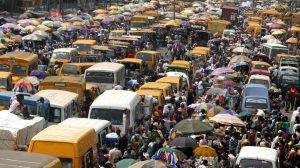
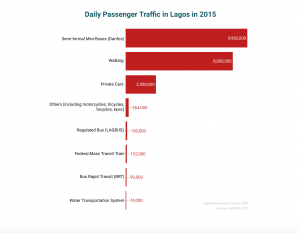
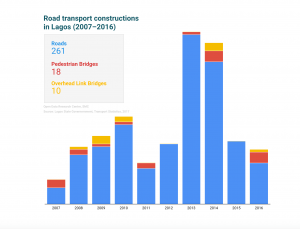
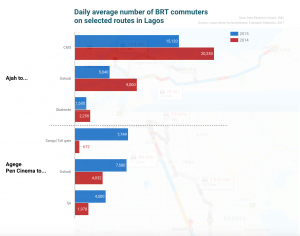
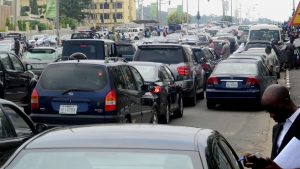

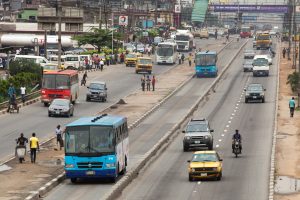








For instance, the 2013-2014 data could show who the contractors were for each project, the due date for their completion as well as how much each project cost the government. Why is this information useful? Because people like me would be able to see which projects commanded the government’s attention, compare various allocations to the various local governments and judge whether our taxes are being used fairly and judiciously. In short, the information would enable us to exercise our rights as citizens of Lagos.